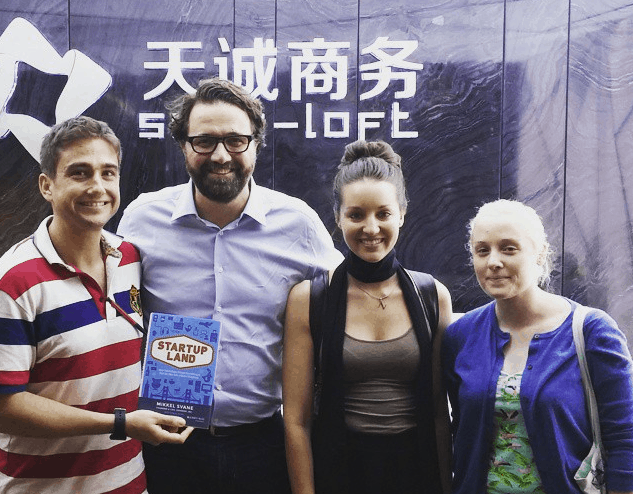Book Review- Startupland
I was fortunate enough to attend Mikkel Svane’s (Zendesk founder and CEO) presentation of his startup journey founding the company in Denmark to relocating to SF and the recent IPO.
I’m really happy he also stopped by Shenzhen on his China visit – as a lot of people are unaware of the size and ability of the tech community here. I was also fortunate enough to get an autographed copy of his book “Startupland” that covers the Zendesk journey, and today I’ll go through some highlights of the book.
Read it in 1 Weekend
I got the book on Friday June 13th, and started reading that night. Hard to put down but had to get some rest, and then finished it over the rest of the weekend. It reads like a story, also including tips and highlights of certain parts of the journey, from dealing with tons of customer feedback, to dealing with differences in the founding team, to having a wife and children moving them around the world while also building up credit card debt. Hardcore!
Makes me feel I’m not alone. And do think it is a good read for any entrepreneur or want-to-be entrepreneur.
Not Too Old To Start a Startup
It was refreshing to read that he started Zendesk when he was 36 years old. I’m a couple years away from hitting that number, and in the book he reveals how he didn’t want to get too much older and felt this may have been one of his last chances. He mentions that his cofounders were also feeling the same way.
Lots of Previous Tech Experience and Rollercoaster Rides
He had always been an entrepreneur, and had started one of the first web forums in Denmark. He had taken some trips to SF before staring Zendesk. He did a web and marketing agency for a while between ventures. He met a cofounder in the local startup community. It’s cool that he shared his tough times in previous ventures and his wanting to still do something big and scalable and not be a consultant forever.
I really connected with that – and this is more of a real story than the typical stories we hear of college dropouts with their first venture to skyrocket to IPO. This is real and a more typical path of an entrepreneur and I really connected with it.
Focused on Team & Market Fit
From early on, Mikkel was always thinking about the right balanced team. The three cofounders spent a year and a half building the product while still doing consulting projects and bootstrapping. No one took a salary, everyone put in their best efforts.
He also had some previous market knowledge of help desk software working in a larger entreprise sales company selling the expensive, full service, installation required consulting plans. So he did have a chance to know the problems and opportunities in the market and it is that which sparked his idea to start Zendesk.
They explain the name of the product wasn’t too important for a while as they built a prototype. And I like how open he is discussing the disputes between the founders about the company name and fundraising decision making issues.
Its All About Relationships
This is really what it boils down to he explains. Relationships with your founding team, with investors (from seed to IPO), with employees, and of course with your customers. To treat your users like real humans and not like a statistic on a “growth hacking” report.
It is making me take a step back now and reflecting on how I think about users of various products. Currently at Unchained Apps, we are dealing with so many various apps and users I am overwhelmed but get a chance to see a lot of different markets and situations.
Motivation For The More “Mature” Entrepreneur
I’d say this book really resonated with me – as he doesn’t just sugar coat and focus on the good times. He discusses the failures, the struggles, the disputes. I would say you should read this if you have had your fair share of good times as well as bad times – and realize that even a company now worth 2 billion dollars (NYSE: ZEN) was so fragile at the early days.
We just gotta keep getting up each day and taking the best shot we have. But I am also motivated to be more strategic about which shots to take. Mikkel explains that while of course there were tweaks in their product, they always understood their customer and the product / market fit from the early days. This is something I am a bit envious of and have to seek out more actively. I want to find that obvious hole in the market where I am positioned in the exact right way to capitalize on it!

Read StartupLand!
What great luck I had to catch him speaking in China and get an autographed copy of the book. Its available on Amazon (I prefer digital books as well) and I do recommend this book if you’re an entrepreneur or thinking about doing it.
With all the talk these days about how cool being a startup is, this one is a bit sobering and realistic and should get you in the right mindset!